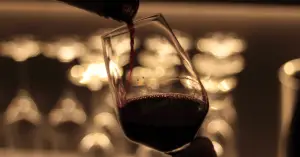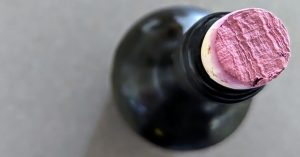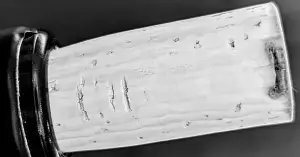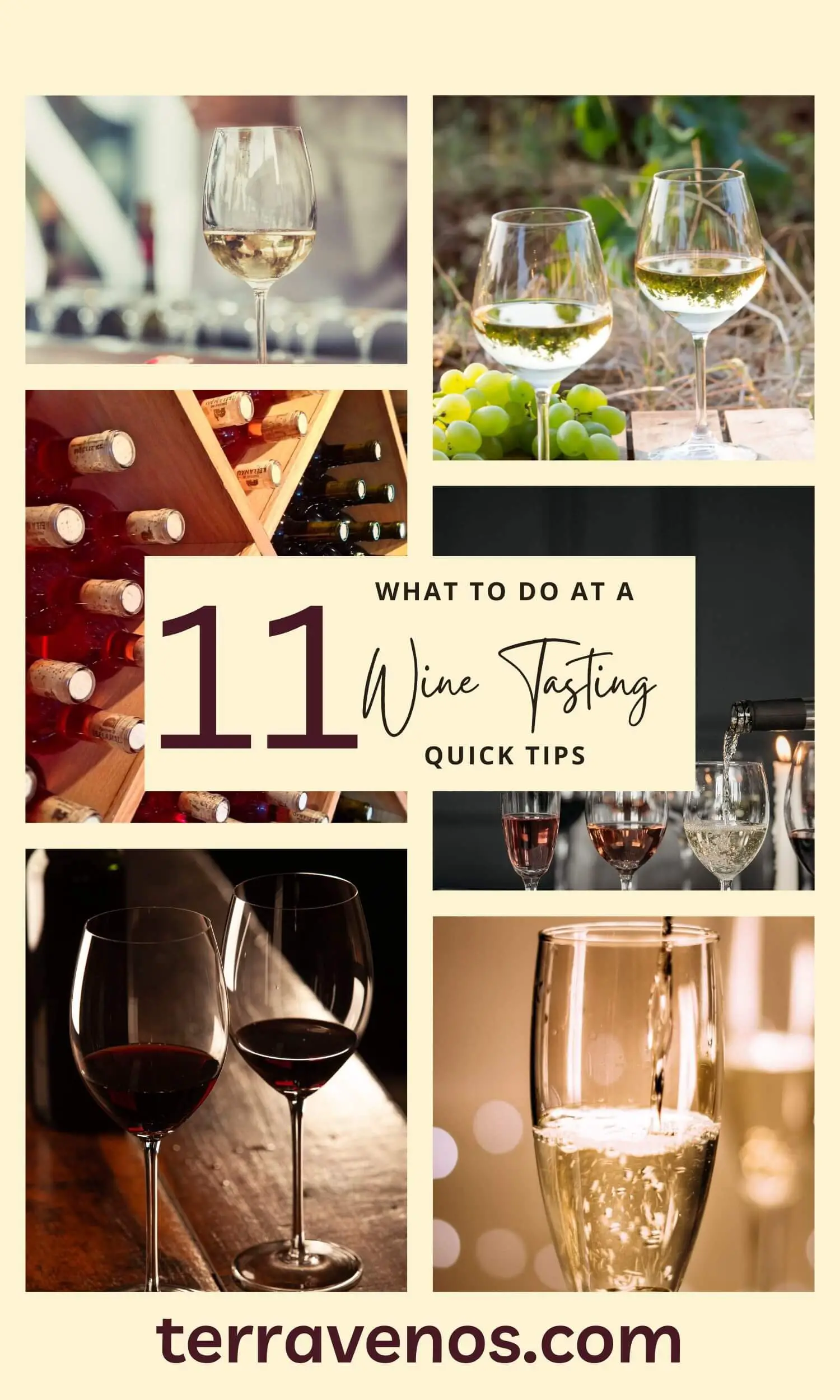
Whether you’re a wine connoisseur or a curious beginner, going wine tasting offers a unique opportunity to explore the nuances of different wines and find new favorites. From swirling and sipping to asking questions and tipping, here’s your quick guide to what to do at a wine tasting.
Here’s what happens at a wine tasting and what you should (and shouldn’t) do.
- What Should I Expect At A Wine Tasting?
- 1. Check to See If You Need a Reservation
- 2. Don’t Brush Your Teeth Beforehand
- 3. Don’t Wear Strong Perfume or Cologne
- 4. Be Adventurous & Try New Wines
- 5. Don’t Hold the Glass by the Bowl
- 6. Cleanse Your Palate
- 7. Is It Rude Not to Finish Wine at a Wine Tasting? No.
- 8. Don’t Go Wine Tasting on an Empty Stomach
- 9. Don’t Drink Too Much, Too Fast
- 10. Ask Questions
- 11. Wine Tasting Tipping Etiquette
- 12. Bonus Tip – Ask to “Revisit” Your Favorite Wine
- Final Thoughts – What to Do at a Wine Tasting? Taste Wines!
What Should I Expect At A Wine Tasting?
A server will present you with different wines (usually 3-8) for you to try. You will get a small, 2 oz pour of each wine. Look at the wine’s color and slowly smell and sip your wines. You’re expected to ask questions and express your likes and dislikes.
What to Do Before Going Wine Tasting: 3 Essential Steps
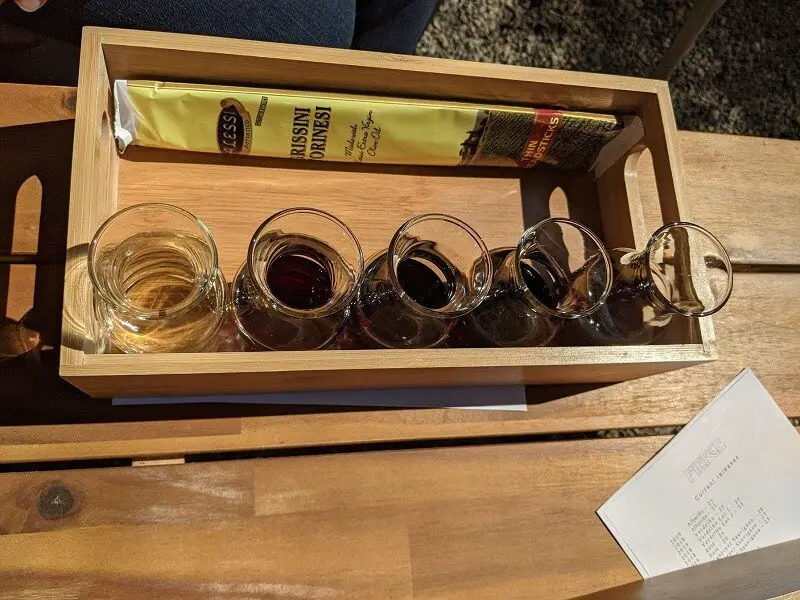
1. Check to See If You Need a Reservation
If you’re planning to attend a wine tasting, it’s important to check if a reservation is required. Since COVID, many tasting rooms switched to reservation-only tastings. This helps them manage customers and give more attention to you and your party, especially during peak seasons.
Booking ahead ensures that you’ll have a spot and can avoid any disappointment (which has happened to me).
It’s also a good idea to ask about any tasting fees or special instructions when making your reservation (for example, I’ve been to private tasting rooms where there’s no cell service, so they advise you not to try to take a rideshare after the tasting).
2. Don’t Brush Your Teeth Beforehand
Even though you may be tempted to brush your teeth before heading out (especially if it’s a date), avoid brushing your teeth right before a wine tasting. Toothpaste alters the pH in your mouth and will affect your ability to taste your wines.
Pro Wine Tasting Tip: If I’m doing a professional tasting that starts in the morning, I brush my teeth first then eat breakfast, then start tasting.
To fully enjoy the nuances of wine, refrain from brushing your teeth immediately before the tasting.
Pro Tasting Tip: Don’t chew gum when wine tasting. Just. No…
3. Don’t Wear Strong Perfume or Cologne
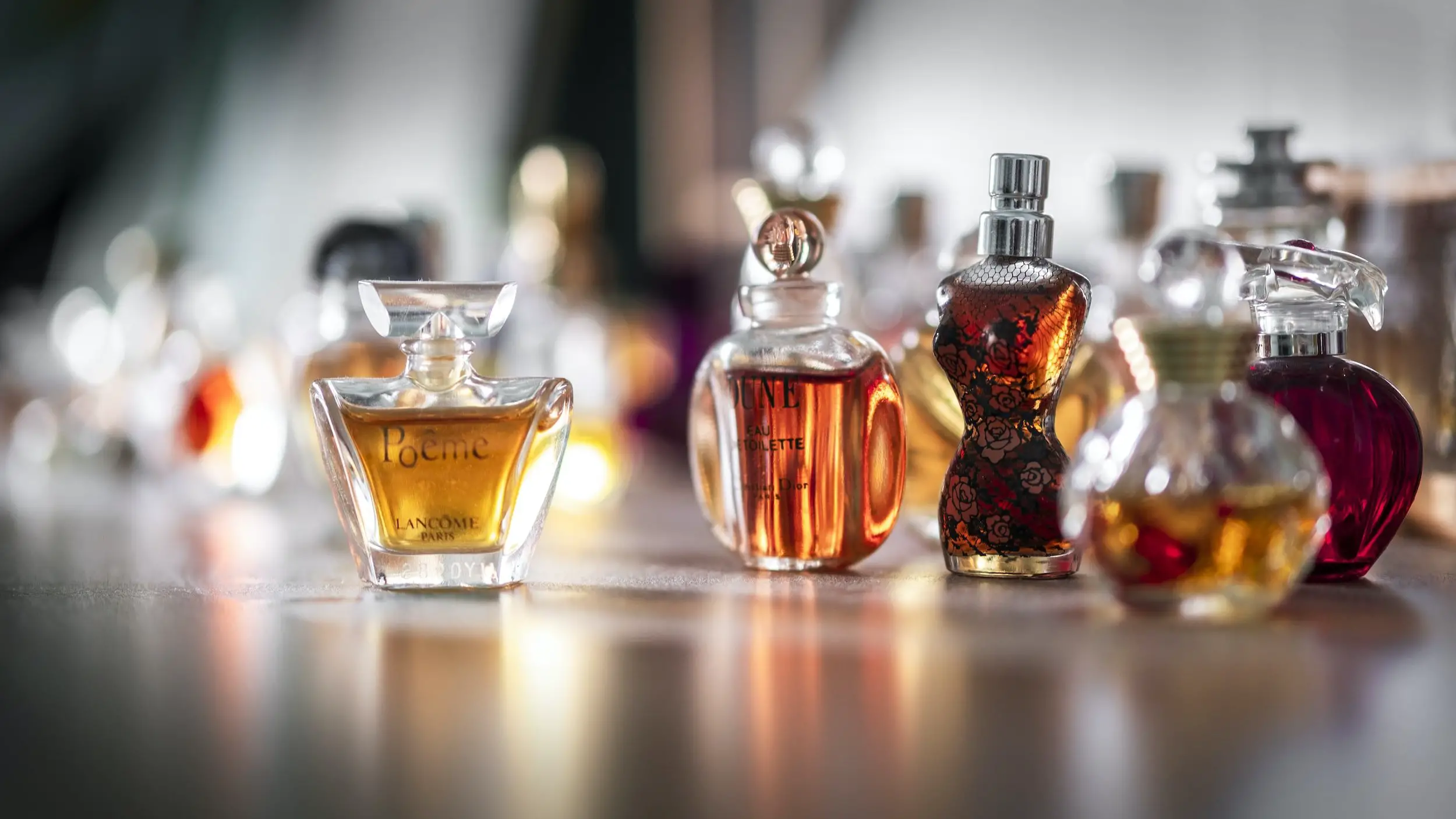
Strong scents from perfumes, colognes, or even strong-smelling lotions can interfere with your ability and that of other guests to smell and taste wine.
Avoid wearing any heavily scented products to a wine tasting, as they can affect your ability to fully appreciate the aromas of the wines. Go for a subtle scent (or no scent at all) to ensure that you can fully immerse yourself in the wine’s aromas and flavors.
What to During a Wine Tasting
Now that you’ve successfully sidled up to the wine bar or settled into your patio settee, here’s what’s next….
4. Be Adventurous & Try New Wines

Wine tastings are the perfect opportunity to explore new flavors and broaden your palate. Try different types of wines, even if they are unfamiliar to you. Be open to experiencing different varietals, regions, and styles.
Wine Tasting Tip: Even if you “only drink red”, or “don’t like rosé”, I encourage you to give every wine on the tasting flight at least a courtesy sip. You’re paying for it, and this is one of the best ways to learn about different wines without buying a whole bottle – especially those that aren’t your personal favorites.
Wine tastings often offer a variety of wines to sample, so use this opportunity to expand your wine knowledge and discover new favorites.
5. Don’t Hold the Glass by the Bowl
Hold your wine glass by the stem, not the bowl.
Your body temperature will heat up the wine if you hold your glass by the bowl.
This can affect the flavors in your wine (no joke – honest truth). Always hold the glass by the stem. If you want to look like a pro, tilt the glass on its side to examine the wine’s color.
6. Cleanse Your Palate

When you drink several different wine styles back-to-back, the flavors can blend into each other. This makes it difficult to tell wines apart. One way to keep your palate (taste buds) fresh and up to the challenge is to have water and crackers to sip and munch on between wines.
Pro Tasting Tip: Bring a water bottle with you or ask for a glass of water at your tasting.
I always carry a water bottle when going out tasting. Take a sip of water and swish it around your mouth between wines to keep your palate fresh.
Pro Tasting Tip: I’m gluten free by allergy, so I carry my own crackers with me to tasting rooms. I’ve never been told ‘no’ when I explain my allergy. If you have allergies, bring a snack that will work for you!
7. Is It Rude Not to Finish Wine at a Wine Tasting? No.
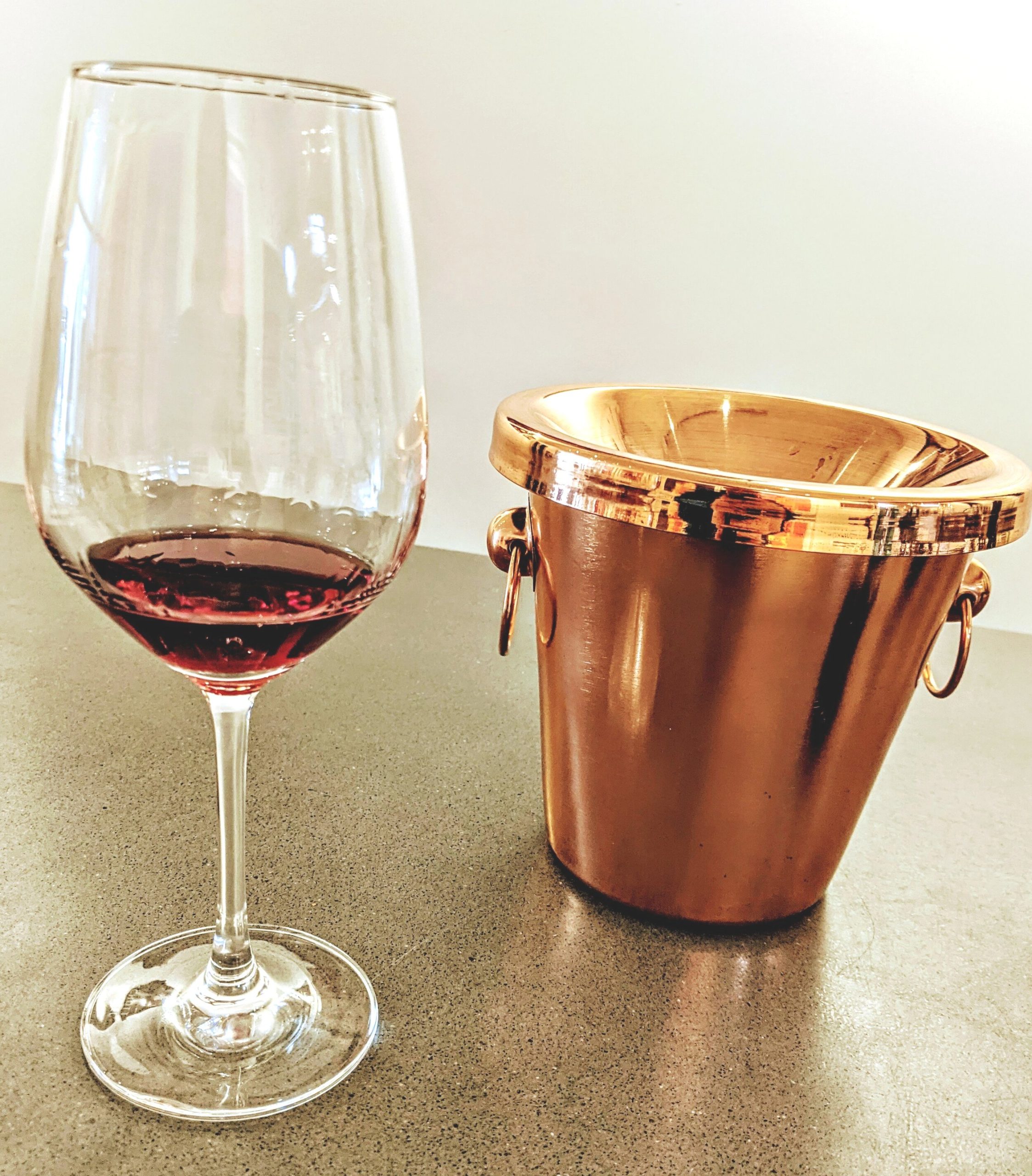
You don’t need to finish your wines. It’s 100% okay (and expected) that you’ll spit or dump wines while tasting.
It’s not rude if you decide not to finish your wine at a wine tasting. Feel free to spit or dump any and all wines.
Wine tastings are usually 2 oz pours. If you taste 5 wines, that’s 10 ounces of wine or 2 full glasses of wine. And if you go to 2 or more tasting rooms, you’re looking at a significant amount of alcohol. (Here’s how much wine you’ll drink at a tasting).
Get comfortable spitting or dumping wines.
Pro Wine Tasting Tip: I’ve gone to several tasting rooms in the past few months where the spit bucket wasn’t easily accessible or at the tasting bar. Ask for the spit bucket if you don’t see it. They don’t mind getting one for you.
Don’t feel like you have to finish every sip of wine, especially if:
- you don’t really like one of the wines
- you need to drive
8. Don’t Go Wine Tasting on an Empty Stomach
Winery tasting rooms don’t always have small bites to enjoy with your tasting menu. This can be because of licensing restrictions or facility restrictions.
Plan on eating beforehand. Some winery tasting rooms offer patios or gardens where you can bring your own picnic to enjoy with their wines.
These types of wine tasting set-ups are some of my personal favorites.
Plan on a meal with protein, carbohydrates, and fats to help absorb the alcohol.
Wine on an empty stomach can quickly affect your ability to taste and evaluate the wine.
9. Don’t Drink Too Much, Too Fast
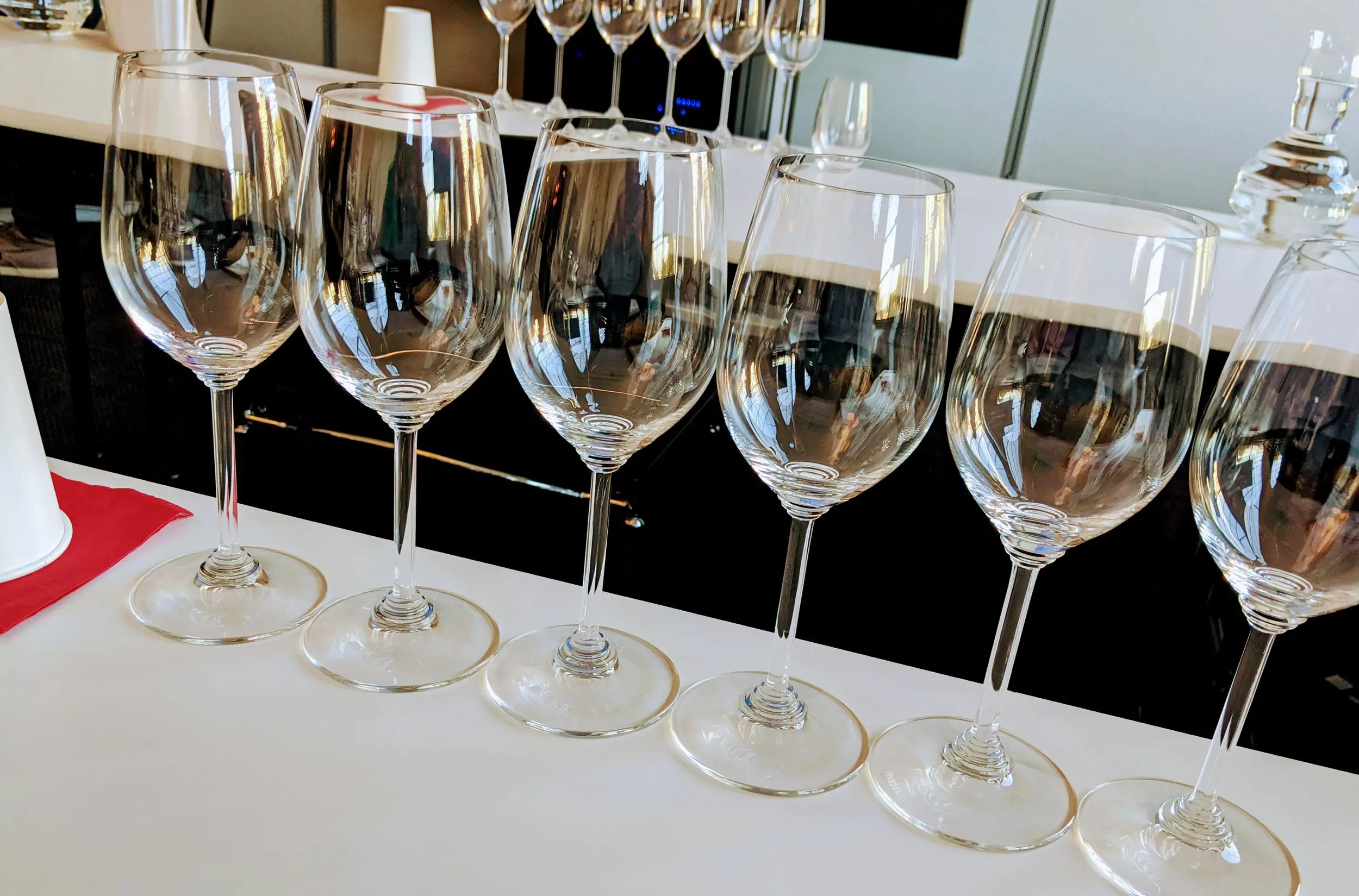
Pace yourself. You’ll be tempted to drink your wines in 1 big gulp. These are tiny pours, after all.
Avoid this temptation.
You don’t want to drink too much, too fast. Remember that wine tastings are about sipping, savoring, and evaluating what you’re tasting, not about getting drunk.
Take a small sip. Let the wine play over your tongue. Experience the flavors.
Drinking too much, too fast will dull your senses and affect your ability to appreciate the wines.
Side Note: I can’t tell you how many times I’ve purchased wines after spending a day tasting (and not spitting) only to get home and discover that the wine I bought wasn’t that great. Be wise. Sip slowly.
10. Ask Questions
Don’t be afraid to ask questions during the wine tasting. Winery staff and tasting room associates are knowledgeable and more than happy to share information about their wines, winemaking, and the grapes.
Helpful Tip: Still new to wine tasting? Check out this post that covers great questions anyone can ask during a wine tasting.
Ask about what you’re tasting, food pairings, serving temperature, and more. Wine tastings are the perfect opportunity to learn about wine and up your tasting game.
11. Wine Tasting Tipping Etiquette
Tipping isn’t mandatory at wine tastings, but it’s a thoughtful gesture to the hosting staff if you enjoyed your visit. Tipping is usually done at your discretion, and it’s best to use cash. Here’s a quick guide to when and how much to tip at a wine tasting.
Helpful Tip: I always carry cash for tipping when wine tasting. Even if you don’t see a tip jar on the counter, you can just leave the tip near your empty glass.
12. Bonus Tip – Ask to “Revisit” Your Favorite Wine
If there’s a wine that you really enjoyed, then once you get to the end of the tasting, you can ask to “revisit” that wine. The servers are usually delighted to offer you another tasting of any wines that stood out. Who knows? This might be just the thing that gets you to go ahead and buy a bottle!
Final Thoughts – What to Do at a Wine Tasting? Taste Wines!
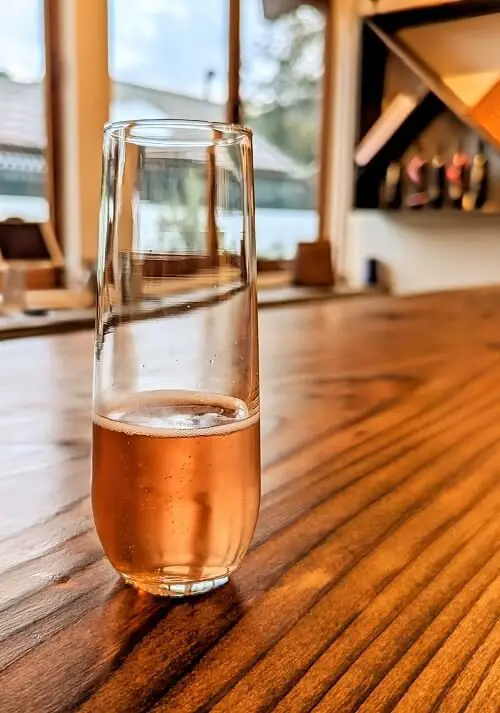
Wine tasting can be a delightfully delicious and educational experience. These easy-to-follow tips will have you sipping like a pro!
Remember to check if reservations are required, eat before the tasting, avoid strong scents, be adventurous and try new wines, cleanse your palate between tastings, spit or dump if necessary, ask questions to learn more, consider tipping as a gesture of appreciation… and pace yourself!
With these guidelines in mind, you’re well on your way to enjoying a memorable wine tasting experience.
Thirsty for More?

Wine tastings are the best way to learn about wine. Before you head out, check out this list of what not to do at a wine tasting.
Check out this post on 8 Things You MUST Know Before Going Wine Tasting for the First Time
Before you head out, make sure that you have a food plan for wine tasting. Most tasting rooms won’t offer food, so here’s what you need to know.
And while you’re busy planning, check out this post that gives you an idea of just how expensive wine tasting is (spoiler: it’s more affordable than you realize!)
Tastings let you try different wines at the same time so that you can compare and contrast. Here’s a great post about hosting your own DIY wine tasting at home with friends (this is how I got started in wine many, many years ago).


